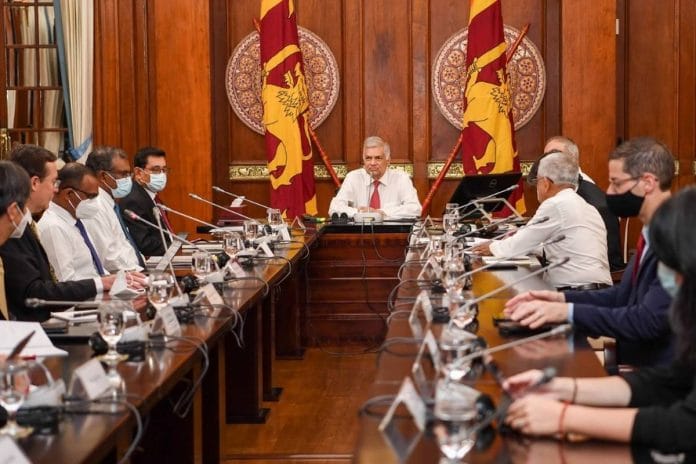New Delhi: Sri Lanka has finally received a long awaited bailout of around $3 billion from the International Monetary Fund (IMF) as it weathers an economic and humanitarian crisis.
The deal, which has been nearly a year in the making, aims to restore “macroeconomic stability and debt sustainability”, ensure financial stability, and scale up structural reforms to “unlock Sri Lanka’s growth potential”, according to a statement issued by the IMF Tuesday.
The UN agency will be conducting a “governance diagnostic exercise”, and will also be closely monitoring efforts to increase tax revenue — expecting a wealth tax to be implemented in the country by 2025.
The extended arrangement will disburse approximately $3 billion over 48 months, and the first tranche of the loan, $333 million, will be released in the next few days. Future disbursements will be tied to reviews that take place every six months.
At a special virtual press briefing Tuesday, the IMF mission chiefs for Sri Lanka said they have been concerned about past policy mistakes and economic shocks, underlining the outsized impact of the crisis on the poor and vulnerable sections of society.
Now that the loan has been approved, the IMF listed immediate targets that Sri Lanka is expected to meet as next steps, like curbing inflation. “With the aid of their legal and financial advisors, Sri Lanka needs to present a debt restructuring strategy which it has committed to by the end of April,” said Peter Breuer, senior mission chief for Sri Lanka, at the press briefing. “This strategy will be used to approach their creditors to reach [IMF] targets.”
The scrutiny comes after months of political and economic instability. Nationwide protests in 2022 overthrew the Rajapaksa government after the country defaulted on its debts for the first time in its history. In the last few weeks alone, trade unions across the country have gone on strike, protesting against high costs of living and the increased taxes — which was a precondition for the IMF bailout.
President Ranil Wickremesinghe and Foreign Minister Ali Sabry both celebrated the bailout package when it was approved Monday.
The IMF program will be imperative to improving Sri Lanka's standing in and access to international capital markets, and it will demonstrate that Sri Lanka is once again a country attractive to talent, investors and tourists.
— Ranil Wickremesinghe (@RW_UNP) March 21, 2023
Also read: Dear Sri Lankans, why are you so happy this Christmas? I don’t get it
1st Asian country to go through ‘governance diagnostic exercise’
Sri Lanka will also be the first country in Asia to undergo a “governance diagnostic exercise” by the IMF. This diagnostic exercise will assess corruption and “governance vulnerabilities” in the island nation.
Anti-corruption is instrumental to IMF aid. Keeping in line with this, the IMF said that the Sri Lankan government has committed to introducing anti-corruption legislation in tune with the United Nations Convention against Corruption — a process it plans on tracking. This proposed legislation is expected to include both asset declaration and asset recovery, according to the IMF.
While the IMF has focussed on governance issues — something it sees as “macrocritical” — in countries like the Democratic Republic of Congo, Paraguay, the Republic of Moldova and Ukraine, this will be the first time it turns its lens to the Asia-Pacific region.
The Wickremesinghe-led government has also been dragging its feet on conducting local elections, which the opposition has been calling for.
“The IMF does not intervene in any electoral governance processes,” said Masahiro Nozaki, mission chief for Sri Lanka, adding that the IMF has never recommended postponing these elections. “In the case of Sri Lanka, elections at every level are a matter for the Sri Lankan people.”
A ‘wealth tax’ by 2025
The IMF also emphasized that efforts to increase tax revenue should be pursued in a growth-friendly manner while protecting the poor.
Listing the problems that are affecting the poor and vulnerable communities in Sri Lanka, the IMF also underlined the importance of a social security net for the poor and vulnerable. The crisis has plunged over 28 per cent of the population — over 6 million people — into food insecurity, and the poverty rate has doubled.
“The necessary reforms — like state owned enterprises, tax reforms, expenditure rationalisation, trade liberalisation, export orientation, etc. — are all beneficial to the poor and vulnerable communities,” Sri Lankan economist Rehana Thowfeek told ThePrint.
“But it’ll be difficult to implement these due to powerful vested groups who benefit from the present economic structure,” she added.
Earlier this year, the country introduced income taxes for professionals ranging from 12.5 to 26 per cent, triggering protests. The tax reforms suggested by the IMF have been specifically designed to be progressive — senior IMF mission chief Breuer, quoted earlier, said that the burden should be carried by those with higher incomes.
“Sri Lanka is amongst the countries that collects the least amount of fiscal revenue in the world, and external creditors aren’t willing to fill the gap between expenditure and revenue,” Breuer said during the press briefing, pointing to tax reforms as integral to regain the confidence of creditors to finance this gap.
The IMF mission chiefs for Sri Lanka also stated that they envisage a wealth tax being implemented in the country by 2025, though details on this are still unclear.
“Commendably, Sri Lanka has started implementing these actions,” said Breuer, adding that the IMF board approval required assurances from official bilateral creditors that they will provide debt relief or assurances, as well as assurance that private creditors would also be addressed. These requirements were met — with Chinese assurance in early March paving the way for the IMF board’s approval.
The IMF Executive Board’s approval is expected to catalyse additional financing from the Asian Development Bank and the World Bank.
(Edited by Gitanjali Das)
Also read: Why the convenor of a ‘liberal’ Sri Lankan political platform finds RSS ‘impressive’






